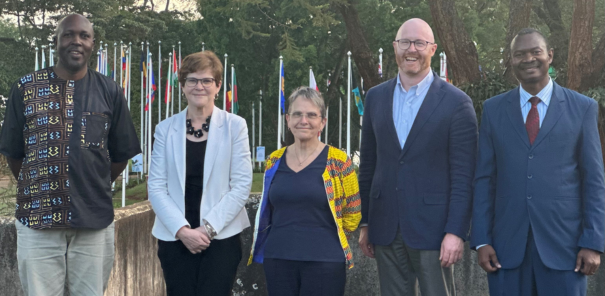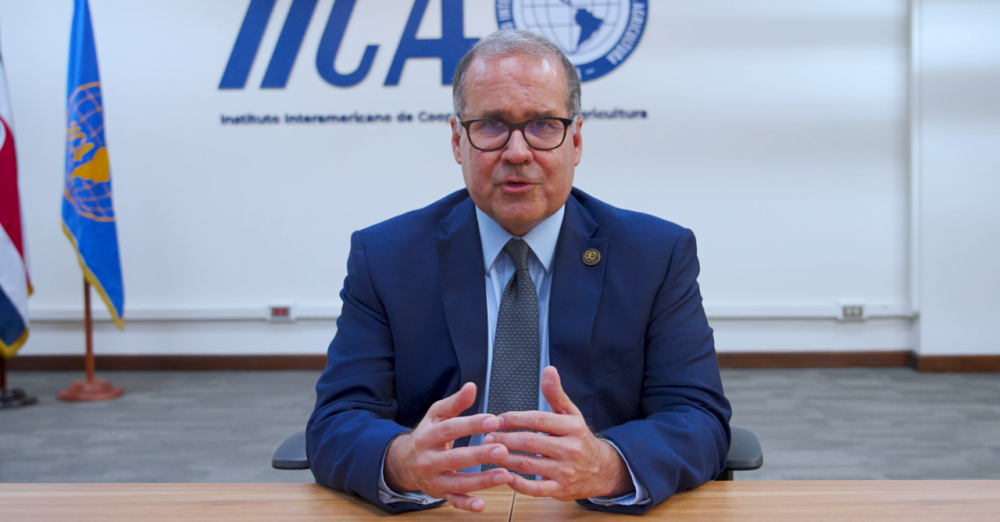At the UN Environment Assembly, in which IICA took part, experts underscored the fact that dairy production can help combat climate change, biodiversity loss, and pollution

Nairobi, Kenya, March 4, 2024 (IICA). In Nairobi, Kenya, representatives of academia and industry attending the United Nations Environment Assembly (UNEA) affirmed that dairy production, an activity that provides sustenance to millions of families in rural areas and contributes to global food and nutrition security, can also provide solutions to the environmental crisis facing the planet.
The Assembly brings together heads of State, senior government and international agency officials, and representatives of civil society and the private sector to discuss multilateral measures aimed at addressing climate change, biodiversity loss, and pollution. The world’s highest-level decision-making body for matters related to the environment, the Assembly meets every two years and is made up of all 193 UN Member States.
The Inter-American Institute for Cooperation on Agriculture (IICA) took part in one of the Assembly’s panel discussions, organized by the International Dairy Federation and the International Livestock Research Institute (ILRI), in collaboration with the U.S. Dairy Exporters Council (USDEC), the National Dairy Development Board of India, the International Dairy Research Institute, and the Environmental Defense Fund.
The title of the side event was “Sustainable dairy ecosystems: nutrition security, women’s empowerment, climate-smart agriculture, action on nature and biodiversity enhancement.”
During the discussion, the speakers explained in detail various actions that producers and the dairy industry are carrying out in different countries to make their activity more sustainable.
The speakers included Krysta Harden, CEO and President of USDEC; John Walker Recha, a researcher at the ILRI; John Tauzel, Senior Director of the Environmental Defense Fund; James Rao, a scientist at the ILRI; Meenesh Shah, President of India’s National Dairy Development Board; and Lloyd Day, Deputy Director General of IICA. Shirley Tarawali, President of the Global Agenda for Sustainable Livestock, delivered the welcoming remarks and moderated the discussion.
“I’m at this Assembly to speak on behalf of producers and ensure their voice is heard by decision-makers. I can assure you that all producers, regardless of where they’re are located or the size of their operation, know how critical it is to care for the soil and biodiversity in order to protect their income,” said Krysta Harden, whom IICA recognized in 2023 as a Rural Leader of the Americas for her tireless advocacy of a leading role for women in food production in the United States.
Harden, who heads USDEC, an IICA partner institution for the promotion of sustainable agriculture and smoother agrifood trade, also emphasized the urgent need to facilitate access to resources and training for farmers. The millions of milk producers around the world need tools to address the challenges posed by the environmental crisis, through science, innovation and the dissemination of good production practices, she argued.
John Tauzel said sustainability should not be seen as a destination but as a journey, given the constant changes in technologies and knowledge in order to better address climate change and other environmental problems.
In tune with the climate objectives
Recognizing the urgent need to implement climate change mitigation and adaptation actions, the dairy sector is taking steps to align itself with the goals established in the Paris Agreement by harnessing science, innovation and new technologies.
Panel members pointed out that greater attention needs to be paid to the ecosystem services provided by sustainable milk production, including the regulation of air and water quality, and the nutrient and pollination cycles. The presence of ruminant animals in ecosystems can also play a positive role in protecting biodiversity and contributing to human health, although this is rarely quantified and recognized.
“The dairy sector generates income for nearly one billion families around the world and contributes to the food security of practically all of humankind, which is why it has a critical role to play in the discussion about the relationship between economic development, people’s well-being, and environmental conservation,” Lloyd Day commented.

The Deputy Director General of IICA explained that dairy products play an irreplaceable role in human nutrition, since they supply nutrients that the body needs, such as calcium and vitamins A and D. “This is essential in Latin America, which was the region of the world most affected by the COVID-19 pandemic,” he observed.
Day added that, “We have to find ways of promoting agriculture that is not only a source of income and food security, but also a source of good management and use of the land. To that end, last October the ministers of agriculture of the Americas, in a meeting held at IICA Headquarters, launched the Hemispheric Partnership for Food Security and Sustainable Development, which seeks to harness scientific advances to raise productivity, while caring for the environment.”
Day also mentioned the work that IICA is carrying out in Mexico, Chile and other countries to contribute to the sustainability and resilience of the dairy sector, placing emphasis on waste management, the circular economy, and the reduction of greenhouse gas emissions.
“The objective,” he concluded, “is to promote a dynamic dairy sector committed to the continuous improvement of its capacity to produce safe, nutritious products from healthy livestock, preserving natural resources and providing producers with decent incomes.”
More information:
Institutional Communication Division.
comunicacion.institucional@iica.int